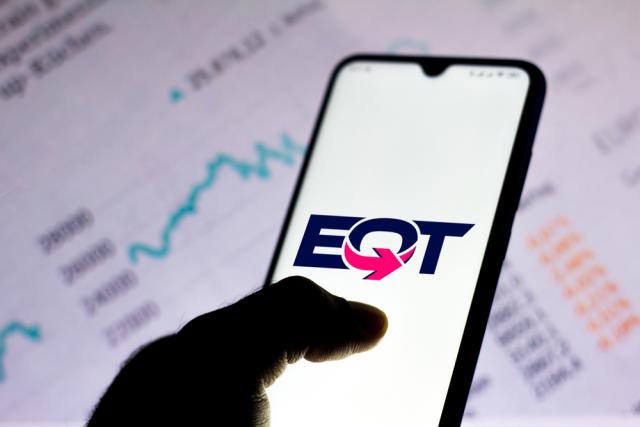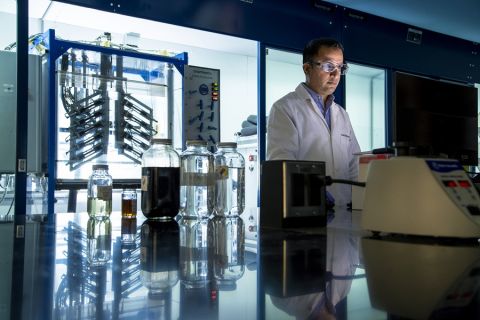
EQT's logo displayed on a smartphone. (Source: Shutterstock)
EQT Corp. has completed a $28 million project to eliminate all of its gas-powered pneumatic devices from its production operations, the company said on Jan. 4.
The company is hoping other oil and gas operators will follow suit in replacing their own pneumatics – a process EQT calls a “key strategic opportunity for industrial self-help” when it comes to emissions.
EQT’s initiative has reduced its methane emissions by 70%, including from its historical assets as well as its acquisitions from Chevron in 2020 and Alta Resources in 2021, the company said. The elimination of nearly 9,000 pneumatic devices reduced its annual carbon footprint by 305,614 metric tons of CO2e.
EQT President and CEO Toby Z. Rice, who has championed natural gas as a way to cleanly power the world, said the company has kept its word to lower emissions.
“We told the world we were aggressively addressing methane emissions and we did what we promised. As the nation's largest natural gas producer, EQT not only delivered on its commitment to eliminate a major source of methane emissions in our operations, we also did it in a cost-effective, expedient way,” Rice said in a news release. “This milestone demonstrates our team's exceptional ability to rapidly evolve EQT's operations through innovation and teamwork and better positions affordable, reliable, clean natural gas as one of the world's most impactful decarbonizing tools.”
EQT’s pneumatic controllers were replaced or retrofitted on production locations and compressor stations through a “fit-for-purpose” technology strategy using primarily electric actuators and air compressor installations.
The company replaced the devices, which are used to manage produced fluids in separators, scrubbers and filters. EQT said such efforts represent a meaningful opportunity for reducing methane emissions within the industry. At EQT, natural gas-powered pneumatic devices were the source of 39% of the company's 2021 production segment Scope 1 greenhouse gas (GHG) emissions.
As part of the initiative, EQT said it installed 341 air compressors and retrofitted 451 dump assemblies as well as 381 motor valves to electric actuators. The conversion process spanned 515 days and was completed a full year ahead of schedule, the company said.
The replacement program required nearly 23,000 man-hours, EQT said.
EQT has a long-standing commitment to ESG and responsibly developing its world-class assets. “The company is on track to meet its previously-announced targets to achieve net zero Scope 1 and 2 GHG emissions in its production segment operations by or before 2025,” the company said.
Recommended Reading
Defeating the ‘Four Horseman’ of Flow Assurance
2024-04-18 - Service companies combine processes and techniques to mitigate the impact of paraffin, asphaltenes, hydrates and scale on production — and keep the cash flowing.
Tech Trends: AI Increasing Data Center Demand for Energy
2024-04-16 - In this month’s Tech Trends, new technologies equipped with artificial intelligence take the forefront, as they assist with safety and seismic fault detection. Also, independent contractor Stena Drilling begins upgrades for their Evolution drillship.
AVEVA: Immersive Tech, Augmented Reality and What’s New in the Cloud
2024-04-15 - Rob McGreevy, AVEVA’s chief product officer, talks about technology advancements that give employees on the job training without any of the risks.
Lift-off: How AI is Boosting Field and Employee Productivity
2024-04-12 - From data extraction to well optimization, the oil and gas industry embraces AI.
AI Poised to Break Out of its Oilfield Niche
2024-04-11 - At the AI in Oil & Gas Conference in Houston, experts talked up the benefits artificial intelligence can provide to the downstream, midstream and upstream sectors, while assuring the audience humans will still run the show.





